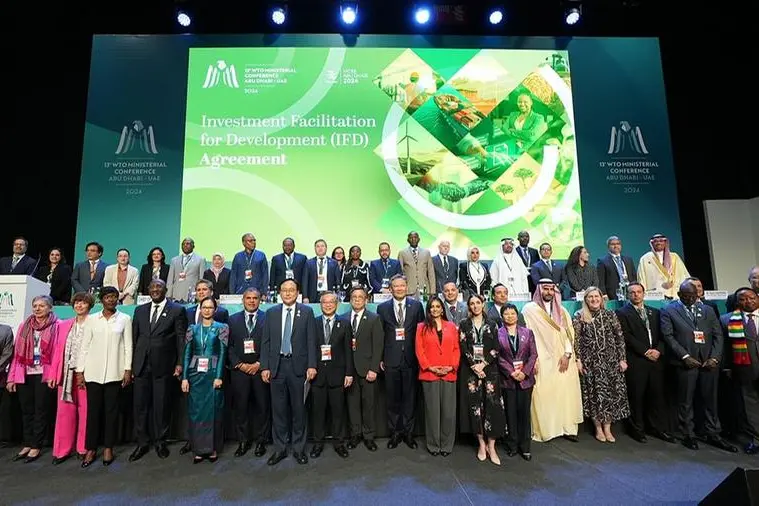PHOTO
Ministers representing 123 World Trade Organisation (WTO) members issued on Sunday a Joint Ministerial Declaration marking the finalisation of the Investment Facilitation for Development (IFD) Agreement, according to a statement by the WTO.
Ministers also issued a submission asking for the 13th WTO Ministerial Conference (MC13), taking place in Abu Dhabi on 26th-29th February, to incorporate the IFD Agreement into Annex 4 of the Marrakesh Agreement Establishing the WTO. Participants represent three-quarters of the WTO membership, including close to 90 developing economies and 26 least-developed economies.
The significant milestone in WTO history of finalisation of the IFD Agreement was marked at a ministerial event held at the Abu Dhabi National Exhibition Center (ADNEC) on the eve of the Ministerial Conference. The text of the Agreement was made available to the public in the three WTO official languages: English, French and Spanish.
WTO Director-General Ngozi Okonjo-Iweala highlighted the importance of the achievement and said, "In the space of six years, you have moved from preparatory work to a pioneering Agreement that promises to help its signatories attract the foreign direct investment they want to drive growth, productivity gains, job creation, and integration into global supply chains." She also emphasised that the IFD Agreement "will contribute to making the global economy more resilient and inclusive."
As the co-coordinators of the successful negotiations, the Vice-Minister of Trade of Chile Claudia Sanhueza and the Minister of Trade of the Republic of Korea Inkyo Cheong made opening remarks at the ministerial event, highlighting that the IFD Agreement shows the WTO can deliver for global trade and development and address current economic challenges by facilitating investment flows, a key driver of economic growth and sustainable development.
Sanhueza said, "By bolstering the capacity to attract, retain, and amplify foreign direct investment, the IFD Agreement becomes an indispensable catalyst for sustainable development. She added, "Once implemented, the IFD Agreement is expected to foster significant economic growth and welfare in developing and LDC members and extend its benefits even to non-participants."
Minister Cheong said, "When some have questions on WTO’s response to the current poly-crisis, we, the 123 co-sponsors, answer with the IFD Agreement."
He added, "The history we are making together today will mark the new beginning from tomorrow. I believe that, together, we will get it done."
Dr. Thani bin Ahmed Al Zeyoudi, Minister of State for Foreign Trade and MC13 Chair, said that the finalisation of the IFD Agreement is the result of more than six years of work, dedication and vision of more than 120 members. "This agreement is proof of the power of collaboration and compromise and the shared vision of an open and rule-based trade," he said.
Participating members took the floor to stress that the IFD Agreement incorporated in the WTO would create clear and consistent global benchmarks for investment facilitation, reducing regulatory uncertainty and making it easier for investors to invest. It would anchor their domestic reforms in shared international commitments, thereby sending a strong signal to investors that a host economy is committed to reforming its investment climate. The Agreement explicitly excludes market access, investment protection and investor-state dispute settlement.
The IFD participants also underlined that, once incorporated in the WTO, the IFD Agreement will allow developing and least-developed country (LDC) members to receive the technical assistance and capacity-building support they need to implement it.
Participants are proposing to add the Agreement to Annex 4 of the Marrakesh Agreement Establishing the WTO. While the IFD Agreement would be plurilateral (binding only on those members that accept it), it is open for all WTO members to join. Participants stressed that incorporation of the IFD Agreement into the WTO is critical for the Agreement to deliver its benefits, notably for developing and LDC members, who are in the greatest need of more sustainable investment flows. An IFD Agreement in the WTO will also serve as a key catalyst for international support for national and regional investment facilitation efforts.
Article X.9 of the WTO Agreement provides that, upon the request of the member parties to the plurilateral agreement, the Ministerial Conference may decide exclusively by consensus to add the agreement to Annex 4. Participants emphasised that they look forward to discussing their request with all WTO members in an open, inclusive and transparent manner during MC13 with a view to achieving their common aspiration of incorporating the IFD Agreement into the WTO as soon as possible.
Held in an open, transparent and inclusive manner, the IFD text-based negotiations were launched in September 2020, building on over three years of preparatory work since a group of 70 WTO members called in December 2017 at MC11 in Buenos Aires for starting "structured discussions" aimed at developing a global framework on investment facilitation for development.





















